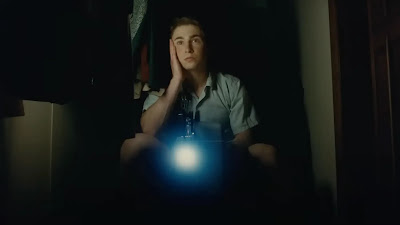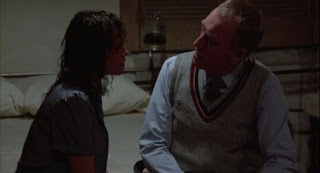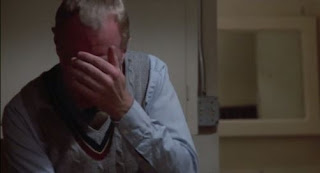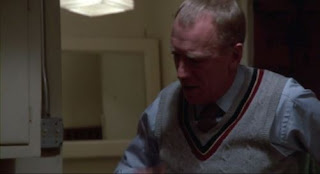or
"Who Spends $40 Million on Therapy?"
“A child is born into a world of phenomena all equal in their power to enslave. It sniffs - it sucks - it strokes its eyes over the whole uncomfortable range. Suddenly one strikes. Why? Moments snap together like magnets, forging a chain of shackles.”
“Look...to go through life and call it yours - your life - you first have to get your own pain. Pain that's unique to you."
Peter Shaffer "Equus"
There is a sequence in Steven Spielberg's The Fabelmans that I found absolutely hilarious, but mine was the only laughter in the theater.
The set-up is that young Sammy Fabelman (at this point played by Mateo Zoryan) is being taken by his parents, Burt (Paul Dano) and Mitzi (Michelle Williams) to his first movie, The Greatest Show on Earth. Sammy is worried. It will be DARK and he's scared of the dark. Father explains the technical aspects of film running as still images that take advantage of the limitations of the eye's retention—the persistence of vision—to simulate a moving image, while Mom takes the romantic view: "Movies are dreams that you never forget." Already the family lines are drawn out between the adults: one is technical, one is artistic.
What happens to the child in between is something else entirely. He sits, rapt, edging closer and closer to the screen to the edge of his seat when something happens that is quite outside his ken: two "bad guys" are robbing a train when one of them notices the circus train is barreling down the tracks at them. Wanting to stop the train, one of the "bad guys" knocks out the other one and drives the car onto the tracks towards the train rushing towards them to warn them about the other one farther down the tracks and prevent the upcoming collision. But, the train has too much momentum; while the guy driving waves his arms in desperation, the train plows into the car flipping it like a toy (which it is) and crashes into the next train causing a massive wreck...achieved by models, inter-cut with live-action scenes of chaos and process shots of fleeing animals.
What happens to the child in between is something else entirely. He sits, rapt, edging closer and closer to the screen to the edge of his seat when something happens that is quite outside his ken: two "bad guys" are robbing a train when one of them notices the circus train is barreling down the tracks at them. Wanting to stop the train, one of the "bad guys" knocks out the other one and drives the car onto the tracks towards the train rushing towards them to warn them about the other one farther down the tracks and prevent the upcoming collision. But, the train has too much momentum; while the guy driving waves his arms in desperation, the train plows into the car flipping it like a toy (which it is) and crashes into the next train causing a massive wreck...achieved by models, inter-cut with live-action scenes of chaos and process shots of fleeing animals.
But, a child wouldn't know that. Driving home, Mitzi asks Sammy "What was your favorite part?" he can't answer...he doesn't answer, still gob-smacked by that approaching train and the disaster that he witnessed before his eyes. At Hannukah, Sammy gets trains as a present—Dad explains the scale and the connections and what makes it go. But, Sammy wants to watch them table-top height to re-create that scene from the movie and sets up elaborate things for it to crash into, inevitably breaking the engine and incurring Dad's disapproval. Break things? You're supposed to FIX things!
But, Mom gets it. Sammy's trying to recreate the scene to make it less scary—he wants to understand it, control it, master it. She gets some film for Dad's movie camera so Sammy can film the train again and again, so he won't be constantly breaking trains. And he shows Mom the movie he made of the train from various angles, various ways to make a model train scary.
But, before the part where Sammy shows his little movie to his thrilled audience, there's a sequence where adult director Steven Spielberg makes an honest-to-god recreation of that "Greatest Show on Earth" crash using miniature trains, toy cars and unsuspecting Hannukah decorations using the same angles DeMille did. And it's amazing. Also funny as Hell. To think Spielberg—at 75 years old—was determined to get that sequence he was trying to make at 6 years old look as good as possible. It's hilarious. It's fun. It's poignant. It's a little brilliant in its meta-sense.
The Fabelmans is Spielberg's telling (with a canny co-script by Tony Kushner*) of the story of his childhood, the birth of his love of making movies and the death of his parents' marriage. It's a story that spans two moves—from New Jersey to Arizona and Arizona to Los Angeles—and ten years and god knows how many hours with an eye to a viewfinder, hours squinting at film through a magnifying glass and cutting and splicing it together with glue as well as graduating from 8mm home movies to 16mm presentations. Oh. He also attended school, got bullied for being Jewish, and getting his first crush...on a shiksa.
Self-indulgent? Sure. But, then you're ignoring Hemingway's maxim "write what you know." Every film-maker (or author) taps into the well of their past** If you dismiss Spielberg doing it, you dismiss Richard Linklater or Francois Truffaut. You can't sneer at The Fabelmans and extoll Cinema Paradiso. Hell, Fellini made a career out of it. Howard Hawks used metaphorical occupations to tell stories about making movies. So, self-indulgent? Sure, join the club!
But, it's a fascinating exercise and an entertaining one, too, because it is Spielberg looking at himself through the rear-view-finder, looking through the aperture and seeing himself, fixing the story where it needs to be finessed or goosed (as he always does) and looking for the tell-tale detail that resonates. Only this time, it's personal, and it's fascinating to look at Spielberg's life as he observed it (or sees it now) and into his mind, as well.
For instance, there is a clear case of imposter syndrome where Sammy Fabelman is the family chronicler, filming everything as observer, story-teller, but ultimately outsider. The revelation comes out in a sequence that could be a horror movie. At a "family conference" it is announced by Mitzi and Burt that they are splitting up—he's going to remain in L.A. for his job and Mitzi is going back to Arizona for her sanity. It is a scene of tears and tearing apart. Spielberg
cuts to a shot of Sammy watching from the stairwell while the whole
traumatic scene unfolds. Cut to a closer shot of Sammy with a look of
horror in his eyes—is it suddenly dawning on him that his family is
splintering apart? Is he reacting to his sisters' emotional trauma? No.
He is reacting to the next shot Spielberg presents: Sammy sees himself (in a
fantasy sequence, inserting himself into the scene) figuring out how to
frame the scene with his camera.That is a frightening scene. It shows that even in the most intimate, personal, affecting scene, he is outside, objectively looking for the angles, almost dispassionately when passions are running high. What has this "hobby," this obsession done to him that he can even see himself doing that, even if it is instinctually? It's a gift and a curse. As Sammy's Uncle Boris (a florid Judd Hirsch) informs him "Art. Family. It will tear you apart!"
The movie is full of small truths, revelations large and small, that inform the color of a life. I could go on and on about details, themes, structures, performance details that inform this movie (and have influenced Spielberg's entire body of work) but that would just be robbing you of a personal experience of discovery, the individual way of connecting dots and frames. In a way, all movie-makers are communicating personally, whether they are telling their own story or somebody else's.
There is another sequence in the L.A. apartment Sammy is sharing with his father. It's very simple; disarmingly simple. Sammy comes home. Burt, soon after. Sammy is tired, frustrated, isn't getting anywhere in L.A. looking for work. The mail's on the table and there's a letter from Mitzi in Arizona, with pictures, snapshots. Does Burt want to see them? Sure.
There's then the standard Hitchcock sequence of three shots. Burt looks at the pictures. Sammy looks at Burt looking. Back to Burt, as Sammy seems him. But, the two shots of the father are not the same, obviously so, even though from the same vantage point, more or less. The first shot includes Burt looking at the pictures. Cut to Sammy looking. The next shot of Burt does not include the pictures—the camera has moved up and the ceiling of the apartment is weighing down on him. That is the shot of Sammy seeing his father's reaction to the snapshot of his absent wife—the sadness, the contemplation, the emptiness. It is SO simple, but it is importantly different, delivering a visual gut-punch you can feel and that is communicated, even if you don't recognize the shift. That is communication in its rawest, visual way, the way that make movies unique in how they tell stories. And Spielberg finds the best way, subtle and overt, to convey that to the audience (whether they recognize it as such or not).
This is why I love Spielberg movies. This is why I love movies.
* Kushner's dedication to "get it right" even exceeded Spielberg's as recounted in this Collider article: https://collider.com/the-fabelmans-ending-tony-kushner-interview/
** Some film-makers go back to recapture their youth. Supposedly, Orson Welles made The Magnificent Ambersons because it reminded him so much of his early childhood. Fellini made Amarcord. Francois Truffaut made The 400 Blows. George Lucas made American Graffiti. Francis Coppola drew on his family life on quite a few of his films. One always gets the impression from Wes Anderson's films that he's tapping into his early years. Robert Benton made Places in the Heart. Mel Brooks produced My Favorite Year. Noah Baumbach made The Squid and the Whale. The trend seems to be gathering momentum. Alfonso Cuaron made Roma. Lee Isaac Chung made Minari. Last year, Kenneth Branagh made Belfast. Paul Thomas Anderson made Licorice Pizza.



















































































